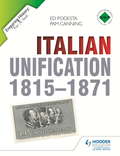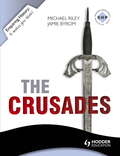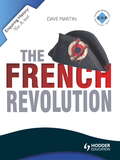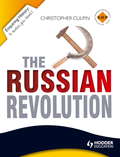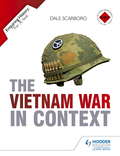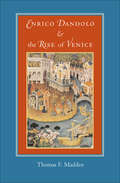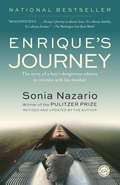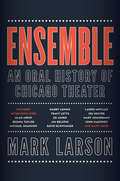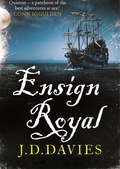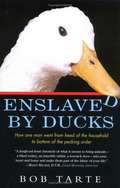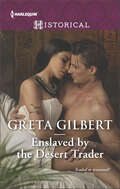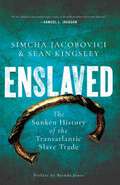- Table View
- List View
Enquiring History: Italian Unification 1815-1871
by Pam Canning Ed PodestaThink more deeply and work more independently at A level History through a carefully thought-out enquiry approach from SHP. Enquiring History: It makes you think! The OFSTED report on school history suggests that the current generation of A Level students have been poorly served by exam-based textbooks which spoon-feed students while failing to enthuse them or develop deeper understanding of History. The Schools History Project has risen to this challenge with a new series for the next generation. Enquiring History is SHP's fresh approach to Advanced Level History that aims: - To motivate and engage readers - To help readers think and gain independence as learners - To encourage enquiry, and deeper understanding of periods and the people of the past - To engage with current scholarship - To prepare A Level students for university Key features of each Student book - Clear compelling narrative - books are designed to be read cover to cover - Structured enquiries - that explore the core content and issues of each period - 'Insights' (Feature panels between enquiries) provide context, overview, and extension - Full colour illustrations throughout Web-based support includes - lesson planning tools and guidance for teachers available from the SHP website http://www.schoolshistoryproject.org.uk/Publishing/BooksSHP/BooksALvlEHS.html - eBooks for whole class teaching or individual student reading available from eBook retailers
Enquiring History: Nazi Germany 1933-45
by Christopher Culpin Steve MastinThink more deeply and work more independently at A level History through a carefully thought-out enquiry approach from SHP.Enquiring History: It makes you think! The OFSTED report on school history suggests that the current generation of A Level students have been poorly served by exam-based textbooks which spoon-feed students while failing to enthuse them or develop deeper understandings of studying HistoryThe Schools History Project has risen to this challenge with a new series for the next generation. Enquiring History is SHP's fresh approach to Advanced Level History that aims: - To motivate and engage readers - To help readers think and gain independence as learners- To encourage enquiry, and deeper understanding of periods and the people of the past- To engage with current scholarship - To prepare A Level students for universityKey features of each Student book- Clear compelling narrative - books are designed to be read cover to cover- Structured enquiries - that explore the core content and issues of each period- 'Insight' panels between enquiries provide context, overview, and extension - Full colour illustrations throughoutWeb-based support includes- lesson planning tools and guidance for teachers available from the SHP website http://www.schoolshistoryproject.org.uk/Publishing/BooksSHP/BooksALvlEHS.html- eBooks for whole class teaching or individual student reading available from eBook retailers
Enquiring History: The Crusades: Conflict and Controversy, 1095-1291
by Michael Riley Jamie ByromThink more deeply and work more independently at A level History through a carefully thought-out enquiry approach from SHP.Enquiring History: It makes you think! The OFSTED report on school history suggests that the current generation of A Level students have been poorly served by exam-based textbooks which spoon-feed students while failing to enthuse them or develop deeper understandings of studying HistoryThe Schools History Project has risen to this challenge with a new series for the next generation. Enquiring History is SHP's fresh approach to Advanced Level History that aims: - To motivate and engage readers - To help readers think and gain independence as learners- To encourage enquiry, and deeper understanding of periods and the people of the past- To engage with current scholarship - To prepare A Level students for universityKey features of each Student book- Clear compelling narrative - books are designed to be read cover to cover- Structured enquiries - that explore the core content and issues of each period- 'Insight' panels between enquiries provide context, overview, and extension - Full colour illustrations throughoutThe Crusades: Conflict and controversy 1095-1291There has never been a more important time to study the Crusades. Religious conflict is a fact of life in the twenty-first century no less than it was in the medieval world. And yet the world of the Crusades is so different from ours that it takes a massive leap of imagination to make sense of these events. This book takes on that challenge: opening a window onto the 12th and 13th century worlds to understand what on earth was going on. It examines the Crusades themselves; the controversies surrounding them; and the past and current re-interpretations of the period. Web-based support includes- lesson planning tools and guidance for teachers available from the SHP website http://www.schoolshistoryproject.org.uk/Publishing/BooksSHP/BooksALvlEHS.html- eBooks for whole class teaching or individual student reading available from eBook retailers
Enquiring History: The French Revolution
by Dave MartinThink more deeply and work more independently at A level History through a carefully thought-out enquiry approach from SHP.Enquiring History: It makes you think! The OFSTED report on school history suggests that the current generation of A Level students have been poorly served by exam-based textbooks which spoon-feed students while failing to enthuse them or develop deeper understandings of studying HistoryThe Schools History Project has risen to this challenge with a new series for the next generation. Enquiring History is SHP's fresh approach to Advanced Level History that aims: - To motivate and engage readers - To help readers think and gain independence as learners- To encourage enquiry, and deeper understanding of periods and the people of the past- To engage with current scholarship - To prepare A Level students for universityKey features of each Student book- Clear compelling narrative - books are designed to be read cover to cover- Structured enquiries - that explore the core content and issues of each period- 'Insight' panels between enquiries provide context, overview, and extension - Full colour illustrations throughoutWeb-based support includes- lesson planning tools and activities for teachers- Dynamic eBooks for whole class teaching or individual student reading- Exam advice for each specification The French RevolutionThis title covers the turbulent history of France from 1774 to 1802 and the revolutionary events and larger than life individuals whose ideas and actions sent shock waves around Europe. Each enquiry tackles a discrete topic which together build a rounded and balanced picture of the causes, the course, the consequences, and the historiography of the revolution. As William Doyle puts it: 'There are few periods in history when so many benevolent intentions led to such unintended chaos and destruction, ...'How and why did this happen? What can we learn from it? What has the French Revolution got to say to us today?Web-based support includes- lesson planning tools and guidance for teachers available from the SHP website http://www.schoolshistoryproject.org.uk/Publishing/BooksSHP- eBooks for whole class teaching or individual student reading available from eBook retailers
Enquiring History: The French Revolution
by Dave MartinThink more deeply and work more independently at A level History through a carefully thought-out enquiry approach from SHP.Enquiring History: It makes you think! The OFSTED report on school history suggests that the current generation of A Level students have been poorly served by exam-based textbooks which spoon-feed students while failing to enthuse them or develop deeper understandings of studying HistoryThe Schools History Project has risen to this challenge with a new series for the next generation. Enquiring History is SHP's fresh approach to Advanced Level History that aims: - To motivate and engage readers - To help readers think and gain independence as learners- To encourage enquiry, and deeper understanding of periods and the people of the past- To engage with current scholarship - To prepare A Level students for universityKey features of each Student book- Clear compelling narrative - books are designed to be read cover to cover- Structured enquiries - that explore the core content and issues of each period- 'Insight' panels between enquiries provide context, overview, and extension - Full colour illustrations throughoutWeb-based support includes- lesson planning tools and activities for teachers- Dynamic eBooks for whole class teaching or individual student reading- Exam advice for each specification The French RevolutionThis title covers the turbulent history of France from 1774 to 1802 and the revolutionary events and larger than life individuals whose ideas and actions sent shock waves around Europe. Each enquiry tackles a discrete topic which together build a rounded and balanced picture of the causes, the course, the consequences, and the historiography of the revolution. As William Doyle puts it: 'There are few periods in history when so many benevolent intentions led to such unintended chaos and destruction, ...'How and why did this happen? What can we learn from it? What has the French Revolution got to say to us today?Web-based support includes- lesson planning tools and guidance for teachers available from the SHP website http://www.schoolshistoryproject.org.uk/Publishing/BooksSHP- eBooks for whole class teaching or individual student reading available from eBook retailers
Enquiring History: The Russian Revolution 1894-1924
by Christopher CulpinEnquiring History: It makes you think!The OFSTED report on school history suggests that the current generation of A Level students have been poorly served by exam-based textbooks which spoon-feed students while failing to enthuse them or develop deeper understandings of studying History.The Schools History Project has risen to this challenge with a new series for the next generation. Enquiring History is SHP's fresh approach to Advanced Level History that aims: To motivate and engage readers To help readers think and gain independence as learnersTo encourage enquiry, and deeper understanding of periods and the people of the past To engage with current scholarship To prepare A Level students for university
Enquiring History: The Vietnam War in Context
by Dale ScarboroThink more deeply and work more independently at A level History through a carefully thought-out enquiry approach from SHP.Enquiring History: It makes you think!The OFSTED report on school history suggests that the current generation of A Level students have been poorly served by exam-based textbooks which spoon-feed students while failing to enthuse them or develop deeper understandings of studying HistoryThe Schools History Project has risen to this challenge with a new series for the next generation. Enquiring History is SHP's fresh approach to Advanced Level History that aims:- To motivate and engage readers- To help readers think and gain independence as learners- To encourage enquiry, and deeper understanding of periods and the people of the past- To engage with current scholarship- To prepare A Level students for universityKey features of each Student book- Clear compelling narrative - books are designed to be read cover to cover- Structured enquiries - that explore the core content and issues of each period- 'Insight' panels between enquiries provide context, overview, and extension- Full colour illustrations throughoutThe Vietnam War in contextThe Vietnam War was much more than just a war. As a conflict it was drawn out and deadly, but in the history of the 20th century its significance goes well beyond those jungle encounters that have been represented in so many feature films. The Vietnam War was also a watershed event in the story of American foreign policy and their attempt to contain Communism. This book examines how and why the Americans got so involved in Vietnam and with what consequences. It also examines its relationship to the Korean War and to World War Two; and how the Vietnam experience shaped US foreign policy over the following decades and into the present. Web-based support includes:- Lesson planning tools and guidance for teachers available from the SHP website http://www.schoolshistoryproject.org.uk/Publishing/BooksSHP/BooksALvlEHS.html- eBooks for whole class teaching or individual student reading available from eBook retailers
Enquiring History: Tudor Rebellions 1485-1603
by Barbara MervynThink more deeply and work more independently at A level History through a carefully thought-out enquiry approach from SHP. Enquiring History: It makes you think! The OFSTED report on school history suggests that the current generation of A Level students have been poorly served by exam-based textbooks which spoon-feed students while failing to enthuse them or develop deeper understanding of History. The Schools History Project has risen to this challenge with a new series for the next generation. Enquiring History is SHP's fresh approach to Advanced Level History that aims: - To motivate and engage readers - To help readers think and gain independence as learners - To encourage enquiry, and deeper understanding of periods and the people of the past - To engage with current scholarship - To prepare A Level students for university Key features of each Student book - Clear compelling narrative - books are designed to be read cover to cover - Structured enquiries - that explore the core content and issues of each period - 'Insights' (Feature panels between enquiries) provide context, overview, and extension - Full colour illustrations throughout Web-based support includes - lesson planning tools and guidance for teachers available from the SHP website http://www.schoolshistoryproject.org.uk/Publishing/BooksSHP/BooksALvlEHS.html - eBooks for whole class teaching or individual student reading available from eBook retailers
Enraptured (Secrets of the Loch #3)
by Candace CampIn the enticing novel from New York Times and USA TODAY bestselling author Candace Camp&’s &“poignant, sensual, emotion-packed&” (RT Book Reviews) Regency romance series, Secrets of the Loch, an unlikely duo discovers love may be the greatest prize of all when they join an exciting treasure hunt through the Scottish Highlands.When Coll Munro finds himself supervising an archaeological dig on the sprawling Highlands estate of Duncally, the handsome Scot&’s only worry is his former crofter friends, who seem to delight in making his job as hard as possible. Little does he know his biggest problem comes in a much smaller package. Gorgeous Violet Thornhill is an exasperating, meddling bluestocking who came to the site to examine the ruins and instead finds herself studying Coll. The unyielding Highlander and the headstrong English beauty clash at every turn. But when a midnight intruder threatens Violet and the excavation itself, these polar opposites must work together to solve a decades-old mystery. As Coll and Violet race to decipher long-buried clues, will they discover riches hidden years ago...or an unbridled passion more precious than gold?
Enrico Dandolo and the Rise of Venice
by Thomas F. MaddenWinner of the 2005 Otto Grundler Award, the International Congress on Medieval StudiesBetween the eleventh and thirteenth centuries, Venice transformed itself from a struggling merchant commune to a powerful maritime empire that would shape events in the Mediterranean for the next four hundred years. In this magisterial new book on medieval Venice, Thomas F. Madden traces the city-state's extraordinary rise through the life of Enrico Dandolo (c. 1107–1205), who ruled Venice as doge from 1192 until his death. The scion of a prosperous merchant family deeply involved in politics, religion, and diplomacy, Dandolo led Venice's forces during the disastrous Fourth Crusade (1201–1204), which set out to conquer Islamic Egypt but instead destroyed Christian Byzantium. Yet despite his influence on the course of Venetian history, we know little about Dandolo, and much of what is known has been distorted by myth.The first full-length study devoted to Dandolo's life and times, Enrico Dandolo and the Rise of Venice corrects the many misconceptions about him that have accumulated over the centuries, offering an accurate and incisive assessment of Dandolo's motives, abilities, and achievements as doge, as well as his role—and Venice's—in the Fourth Crusade. Madden also examines the means and methods by which the Dandolo family rose to prominence during the preceding century, thus illuminating medieval Venice's singular political, social, and religious environment. Culminating with the crisis precipitated by the failure of the Fourth Crusade, Madden's groundbreaking work reveals the extent to which Dandolo and his successors became torn between the anxieties and apprehensions of Venice's citizens and its escalating obligations as a Mediterranean power.
Enrico Fermi, Atomic Physics Lectures (History of Physics)
by Aldo Treves Pasquale TucciIn autumn of 1949, Enrico Fermi returned to Italy after an eleven-year absence to deliver nine lectures, six in Rome and three in Milan. Apart from subsequent limited publication, this material has been little seen by the larger scientific community. This volume represents the first time that these nine lectures have been published in English. The nine lectures collected in this book represent a precious document of Fermi’s view on topics with which he had engaged in the previous decades. They were addressed to the young Italian physicists and to a more general audience only then beginning to recover from the physical and moral disruption of the war. Published in collaboration with the Italian Physical Society (SIF), the book includes a presentation of the president of SIF, an introduction written by the editors, and two substantial essays: one on Fermi’s life, and a second on Fermi’s skill in talking about Physics in a clear and sparkling manner. The volume appears as a contribution to the 70th anniversary of Fermi's death, and should appeal not only to students of physics, but to both those with an interest in the history of science in general and those who wish for a clearer picture of the life and mind of this pioneering physicist.
Enrique Martínez Celaya: Collected Writings and Interviews, 2010-2017
by Enrique Martínez CelayaThis collection, spanning nearly a decade of artistic activity, features selections of writings that trace the intellectual influences and track the development of one of the more formidable and productive minds in the contemporary art world. The writings comprise Enrique Martínez Celaya&’s public lectures; essays; interviews; correspondence with artists, critics, and scholars; artist statements; blog posts; and journal entries. These texts were written during Martínez Celaya&’s appointment as Visiting Presidential Professor at the University of Nebraska; Roth Distinguished Visiting Scholar at Dartmouth College; and, most recently, as the first Provost Professor of Humanities and Arts at the University of Southern California. Marked by Martínez Celaya&’s encyclopedic curiosity and considerable knowledge about the world, these writings and interviews explore the role of art in life, evaluate texts by other modern and contemporary artists and thinkers, and reveal the artist&’s deep engagement with artistic, philosophical, and literary lines of inquiry.
Enrique's Journey: The Story of a Boy's Dangerous Odyssey to Reunite with His Mother
by Sonia Nazario<P>In this astonishing true story, award-winning journalist Sonia Nazario recounts the unforgettable odyssey of a Honduran boy who braves unimaginable hardship and peril to reach his mother in the United States. <P>When Enrique is five years old, his mother, Lourdes, too poor to feed her children, leaves Honduras to work in the United States. <P>The move allows her to send money back home to Enrique so he can eat better and go to school past the third grade. Lourdes promises Enrique she will return quickly. But she struggles in America. Years pass. He begs for his mother to come back. Without her, he becomes lonely and troubled. When she calls, Lourdes tells him to be patient. Enrique despairs of ever seeing her again. <P>After eleven years apart, he decides he will go find her. Enrique sets off alone from Tegucigalpa, with little more than a slip of paper bearing his mother's North Carolina telephone number. Without money, he will make the dangerous and illegal trek up the length of Mexico the only way he can-clinging to the sides and tops of freight trains. With gritty determination and a deep longing to be by his mother's side, Enrique travels through hostile, unknown worlds. <P>Each step of the way through Mexico, he and other migrants, many of them children, are hunted like animals. Gangsters control the tops of the trains. Bandits rob and kill migrants up and down the tracks. Corrupt cops all along the route are out to fleece and deport them. To evade Mexican police and immigration authorities, they must jump onto and off the moving boxcars they call El Tren de la Muerte--The Train of Death. <P>Enrique pushes forward using his wit, courage, and hope-and the kindness of strangers. It is an epic journey, one thousands of immigrant children make each year to find their mothers in the United States. <P>Based on the Los Angeles Times newspaper series that won two Pulitzer Prizes, one for feature writing and another for feature photography, Enrique's Journey is the timeless story of families torn apart, the yearning to be together again, and a boy who will risk his life to find the mother he loves.
Ens van robar la joventut: Memòria viva de la Lleva del biberó
by Victor AmelaEns van robar la joventut narra les històries dels «biberons» que van combatre a l'Ebre, dels adolescents que es van allistar voluntaris (tant a l'exèrcit republicà com al de Franco), dels que van sobreviure i (alguns) van continuar la seva lluita a la Guerra Mundial, dels que van ser empresonats i dels que van morir en el camp de batalla. Cap al final de la Guerra Civil, 27.000 nois nascuts l'any 1920 van ser cridats a files. Se'ls va conèixer com la Lleva del Biberó i molts d'ells ni tan sols tenien divuit anys quan van perdre la vida a la sagnant batalla de l'Ebre. Els supervivents van acabar en penals i en presons franquistes, en camps de concentració o en batallons disciplinaris, i van haver de fer després un llarg servei militar. Tots van conservar de per vida el terrible record d'aquella guerra en la qual van combatre amb espardenyes i sense cartutxeres. La sarna, els polls, la set, les caminades, la metralla. Les veus trencades dels nois moribunds al camp de batalla cridant a les seves mares. Els companys morts, enterrats a centenars a la Venta de les Camposines. Un malson repetit nit rere nit, i durant anys, en el moment de tancar els ulls. La certesa que els havien robat la joventut. Víctor Amela ha recopilat el valuós testimoni de vint-i-cinc supervivents i ha reconstruït amb una investigació minuciosa la memòria d'aquests nois que van viure uniformats dels disset als vint anys. I aquestes commovedores històries humanes constitueixen -gràcies al rigor periodístic de l'autor i a la seva passió en la narració dels fets- en l'homenatge necessari i sentit als herois anònims de la Lleva del Biberó quan tot just ara es compleix el centenari del seu naixement.
Ensemble: An Oral History of Chicago Theater
by Mark LarsonThis definitive history brings Chicago’s celebrated theater and comedy scenes to life with stories from some of its biggest stars spanning sixty-five years.Chicago is a bona fide theater town, bursting with vitality that thrills local fans and produces generation after generation of world-renowned actors, directors, playwrights, and designers. Now Mark Larson shares the rich theatrical history of Chicago through first-person accounts from the people who made it.Drawing from more than three hundred interviews, Larson weaves a narrative that expresses the spirit of Chicago’s ensemble ethos: the voices of celebrities such as Julia Louis-Dreyfus, Ed Asner, George Wendt, Michael Shannon, and Tracy Letts comingle with stories from designers, composers, and others who have played a crucial role in making Chicago theater so powerful, influential, and unique.Among many other topics, this book explores the early days of the fabled Compass Players and the legendary Second City in the ‘50s and ‘60s; the rise of acclaimed ensembles like Steppenwolf in the ‘70s; the explosion of storefront and neighborhood companies in the ‘80s; and the enduring global influence of the city as the center of improv training and performance.
Enseñando rebeldía: Historias de la lucha popular oaxaqueña
by Diana DenhamAccompanied by photography and political art, this powerful compilation of testimonies from longtime organizers, artists, housewives, journalists, students, teachers, and others who participated in the Popular Assembly of the Peoples of Oaxaca provides a raw, honest look at the 2006 Oaxaca protests to the political situation in the Mexican state—protests that would become one of the most important social uprisings of the 21st century. Acompañada de fotografías y arte político, esta compilación poderosa de testimonios de organizadores, artistas, amas de casa, periodistas, estudiantes, maestros y otros que participaron en la Asamblea Popular de los Pueblos de Oaxaca provee un vistazo abierto y honesto de las protestas oaxaqueñas del 2006 contra la situación política en el estado mexicano—protestas que se convertirían en una de las revueltas sociales más importantes del siglo XX1.
Ensign Royal (The Matthew Quinton Journals)
by J. D. DaviesPart of an &“excellent series,&” this prequel reveals a British military man&’s first battles in support of the Crown Jewels in seventeenth-century England (Publishers Weekly). Matthew Quinton, eighteen years old and an ensign in the Royalist Army in Exile, is sent by his older brother the Earl of Ravensden into the heart of Oliver Cromwell&’s England. Surrounded by enemies, he soon becomes tangled in a dark web of conspiracy . . . Before long Quinton will have his first bloody taste of war, in the Battle of the Dunes, June 1658. In the battle Roundheads and royalists will fight one another one final time . . .Ensign Royal is a thrilling prequel to the Matthew Quinton Journals series of nautical sagas. Praise for the writing of J. D. Davies: &“Hornblower, Aubrey and Quinton—a pantheon of the best adventures at sea!&” —Conn Iggulden, #1 New York Times–bestselling author of The Conqueror and War of the Roses series &“A hero worth rooting for.&” —Publishers Weekly &“Utterly impossible to put down . . . Finely-shaded characters, excellent plotting, gut-clenching action and immaculate attention to period detail . . . Superb.&” —Angus Donald, author of The Outlaw Chronicles series &“Destined to be a classic of nautical adventure series.&” —Eric Jay Dolin, author of Leviathan and Fur, Fortune, and Empire &“A naval adventure that goes well beyond the usual outlines of the genre to paint a lively portrait of England in the 1600s.&” —Kirkus Reviews
Ensign in Italy: A Platoon Commander's Story
by Philip BurtonIn 1943, aged 18, Philip Brutton relinquished his place at Cambridge to volunteer for the Welsh Guards. He was commissioned the same year and was Ensign of the Guard as St James's Palace when a near miss by the Luftwaffe hit and badly damaged the surrounding area. At 19, in early 1944, he was sent to Italy where he joined his Regiment and was soon on patrol in the dead-man's-land of the Cassino ruins, threading his way nightly through the minefields, under constant threat of enemy attack, shelling and mortaring. He survived to fight with the 3rd Battalion Welsh Guards as a young battle-hardened platoon commander throughout the major encounters of the Italian campaign involving 1st Guards' Brigade. In Austria, under orders, he handed over the Croatian Government and then 2000 men plus their families to their communist executioners: the Great Betrayal. A regular officer, he was stationed in Palestine before the end of the British Mandate, and after a period with The Prince of Wales's Company, 1st Battalion Welsh Guards, he became a Staff Captain at Headquarters 1st Guards' Brigade, aged 21.
Ensina-me a te amar
by Daniela Reis Jana WestwoodHenrietta e Lidia, as duas filhas de Lady Margaret Tomlin, não receberam o mesmo carinho por parte de sua mãe. Para Lady Tomlin, sua filha mais velha é feia e entediante, enquanto Lidia é um exemplo de perfeição. Henrietta é uma mulher à frente de seu tempo, que não precisa ser bajulada para levar uma vida feliz. Lidia é a noiva de Robert, Lord Worthington, e em breve celebrarão seu casamento. Ou não, porque o destino vai surpreender essas duas irmãs. Amor de paixão e intriga na Inglaterra do século XIX.
Enslaved
by Hope TarrMore than ten years ago, orphans Daisy Lake and Gavin Carmichael made a pact to stay together before Daisy was taken away. Now she is only a precious, painful memory until Gavin walks into an East End club where the headlining act is the infamous nightingale of the Montmarte music halls--Daisy. Original.
Enslaved
by Virginia HenleyWhere are all the real men? she wondered...For Lady Diana Davenport, they existed only in her books and dreams. There she could lose herself, becoming the licentious Diana, goddess of the hunt--far from the rigid restraints of eighteenth-century London, where she was courted by fops and fools. That is, until she tried on an authentic Roman helmet in an antiques store and was catapulted back in time, landing in Marcus Magnus's arms. This was no dream! She was lost in Aquae Sulis, the city she knew as Bath, prisoner of a Roman general who accused the violet-eyed beauty of being a Druid spy--and then made her his slave!"COME TO ME."His words were soft, imperious, charged with danger and desire. Marcus Magnus was powerful, arrogant, and infuriating. A real man. And now Lady Diana was his slave, hostage to his will, vowing to fight him to the end--with every seductive weapon she possessed....Virginia Henley is the author of eight romances published by Dell, including the New York Times bestsellers Seduced and Desired.She divides her time between Ontario, Canada, and St. Petersburg, Florida.From the Paperback edition.
Enslaved by Ducks: How One Man Went from Head of the Household to Bottom of the Pecking Order
by Bob TarteWhen Bob Tarte left the Michigan suburbs for the country, he was thinking peace and quiet. He'd write his music reviews in the solitude of his rural home on the outskirts of everything. Then he married Linda. She wanted a rabbit. How much trouble, he thought, could a bunny be? Well, after the bunny chewed its way through their electrical wires and then hid inside the wall, Bob realized that he'd been outwitted. But that was just the beginning. There were parrots, more rabbits, then ducks and African geese. The turkeys, stranded on a nearby road, fighting for their lives. The starlings. The sad, ugly duck for sale for 25 cents. One day Bob looked around and saw he was not only outnumbered, but that he'd become a servant to an extremely demanding family: Stanley Sue, a gender-switching African grey parrot; Hector, a cantankerous shoulder-sitting Muscovy duck; Howard, an amorous ring-necked dove; Chloe, a mallard who learned to limp; and a host of others. And, against every instinct in him, Bob became their slave. He read all the classic animal books--The Parrot Who Owns Me, The Dog Who Rescues Cats, Arnie the Darling Starling, That Quail Robert, The Cat Who Came for Christmas--about the joys of animals, the touching moments. But none revealed what it was really like to live with an unruly menagerie. This hilarious memoir gives us the other side--about a man who, against all bets, was converted to a doting and proud animal lover.
Enslaved by the Desert Trader
by Greta GilbertPassion hotter than the Egyptian sun... In the Great Pyramid of King Khufu, resourceful Kiya works tirelessly, disguised as a boy. But then fearsome raiders arrive and, running for her life, she is captured by a hardened desert trader... When he realizes what a beauty he has enslaved, Tahar knows he could-and should-sell her for a handsome price. But Kiya is not easily tamed. And when a wild heat explodes between them, shattering all thoughts of resistance, Tahar must find a way to keep her as his own!
Enslaved by the Viking: An Intense Story of Forbidden Passion (Viking Warriors #1)
by Harper St. George"From this day forward, you are mine." The moment Merewyn sets eyes on the warrior standing atop a Viking raiding ship, something inside her stirs. By all rights, she should fear him, should run from him, yet she cannot help but be drawn to him. Eirik has never before taken a woman captive, yet Merewyn inspires a longing that calls to the darkness within him. He takes her back to his homeland as his slave, where they finally succumb to passion. And as the lines between captor and captive blur, Eirik realizes they have crossed into dangerous territory...
Enslaved: The Sunken History of the Transatlantic Slave Trade
by Simcha Jacobovici Sean KingsleyA riveting and illuminating exploration of the transatlantic slave trade by an intrepid team of divers seeking to reclaim the stories of their ancestors. From the writers behind the acclaimed documentary series Enslaved (starring Samuel L. Jackson), comes a rich and revealing narrative of the true global and human scope of the transatlantic slave trade. The trade existed for 400 years, during which 12 million people were trafficked, and 2 million would die en route. In these pages we meet the remarkable group, Diving with a Purpose (DWP), as they dive sunken slave ships all around the world. They search for remains and artifacts testifying to the millions of kidnapped Africans that were transported to Europe, the Americas, and the Caribbean. From manilla bracelets to shackles, cargo, and other possessions, the finds from these wrecks bring the stories of lost lives back to the surface. As we follow the men and women of DWP across eleven countries, Jacobovici and Kingsley&’s rich research puts the archaeology and history of these wrecks that lost between 1670 to 1858 in vivid context. From the ports of Gold Coast Africa, to the corporate hubs of trading companies of England, Portugal and the Netherlands, and the final destinations in the New World, Jacobovici and Kingsley show how the slave trade touched every nation and every society on earth. Though global in scope, Enslaved makes history personal as we experience the divers&’ sadness, anger, reverence, and awe as they hold tangible pieces of their ancestors&’ world in their hands. What those people suffered on board those ships can never be forgiven. Enslaved works to ensure that it will always be remembered and understood, and is the first book to tell the story of the transatlantic slave trade from the bottom of the sea.
